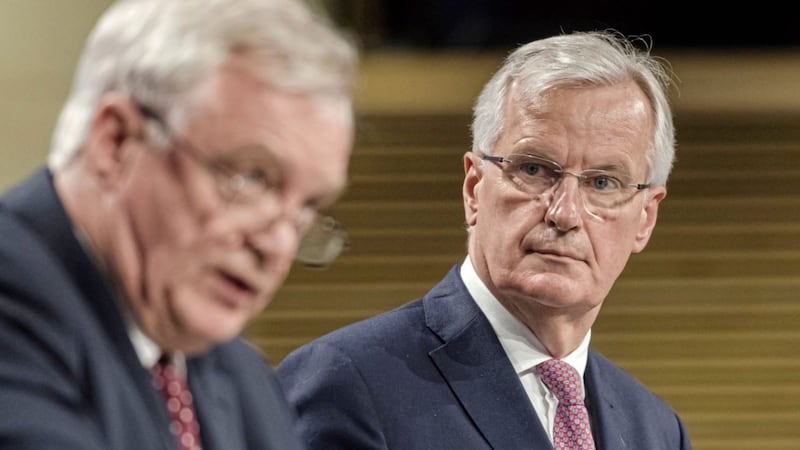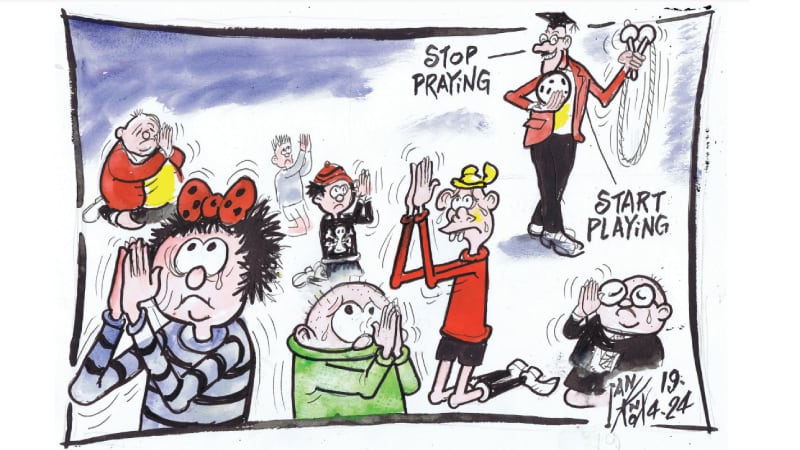After Brexit everybody in Northern Ireland is going to wake up and realise that the reality is that the Good Friday Agreement (GFA) no longer exists. The reason that this agreement was possible, in the first place, was that Britain was part of the EU and that cooperation became the name of the game.
Post-Brexit, Northern Ireland will literally be back to where it was in 1969 – impoverished and cut off from the Republic and cut off from the world. And the British perspective on things will rule.
Sinn Féin believes that they can redeem the GFA and are trying to find a future modus operandi for it. Sinn Féin may ultimately regret not seizing an opportunity to change the political agenda by going to Westminster.
Over the course of the past 20 years the economic damage caused by the presence of an economic border has been assuaged but has not been completely overcome.
A hard border for Northern Ireland is going to be an economic, social and political disaster, in that order. What may be required is a completely new political dispensation for Northern Ireland.
The British government are abiding by the letter of the law on the GFA. But in the spirit of it has already torn it up. They wish to be freed of their obligations to the EU.
Unshackled by the EU they can do what they wish when they leave and Irish concerns will be of little importance. Pivotal to the GFA was an assurance, by politicians, that the EU border would be made invisible and there would no longer be physical checks of movement across the border. It was this assurance that was a critical factor in making the peace process possible.
However, there might be a political solution to the border problem and it may well take a new political dispensation to resolve it. The British government may have to consider a partial disengagement from Northern Ireland. They are currently not giving any thought to where the current demographics in Northern Ireland are leading. In 15 or 20 years are we going to find ourselves at another cliff edge which neither the British or Irish governments have prepared for? Of course, if all the young people now have to emigrate the problem will not arise.
One possible solution is for Northern Ireland to cease being an integral part of the UK and for it to become a British Protectorate within the EU. The majority of people in Northern Ireland did vote Remain. Of course, such a decision would rest ultimately with the British government but it would respect the rights of Irish nationalists and the rights of unionists to remain British. The unionists could be given a generous majority veto, for instance a 75 per cent majority vote, for a British Protectorate to move eventually to some other form of all-Ireland agreement, or even a British Irish agreement. Such an arrangement might even allow the whole process to flow at a leisurely pace and enable people to decide what sort of arrangement is ultimately in everybody’s interest.
The DUP are likely to be dismissive of such a proposal but there may well be unionist voices, among farmers and business people, who may see advantages in such a proposal. Of course, the optimum solution would be for the British government to rescind the decision to leave the EU and for society to continue with rebuilding life under the terms of the GFA.
J HUGHES
Ballycastle, Co Antrim
Ending academic selection key to reversing educational disadvantage
Before he retired last year Sir Michael Wilshaw, the Chief Inspector of Schools in England, gave an interview to The Observer newspaper where he posed the rhetorical question – ‘Which great education system has selection at 11? I don’t know any’.
At Prime Minister’s Question Time in September 2016 Theresa May was asked by Jeremy Corbyn to name any education experts in favour of a grammar school system. She couldn’t name one.
Last year an analysis of GCSE performance in selective state schools carried out by the Education Policy Institute concluded that grammar schools do not improve the exam results of bright students beyond what they would have achieved at a good comprehensive while more grammar schools would widen the attainment gap between rich and poor.
And last week in Northern Ireland we saw the publication of a major report, ‘Investigating Links in Achievement and Deprivation’. The report was carried out over three years by 10 experts from the Centre for Shared Education at Queen’s University. The report found that there is a lack of equality in the Northern Ireland education system and that better off children had access to better teaching.
‘The current system significantly favours those with positive family norms around education, for example, academically successful parents, and the financial capacity to afford, for example, private tutors’. The report has recommended a number of wide ranging reforms. Key, it said, to reversing educational disadvantage is ending the current system of academic selection.
This new report is just one in a long line of reports that have made similar recommendations. We’ve had a number of reports from the OFMDFM, The Public Accounts Committee, the Equality Commission, the PUP and the OECD.
Once again this report highlights the underachievement of boys living in deprived Protestant areas.
Over the years the DUP has ignored all the research on the detrimental effects of academic selection. They have shown a blatant disregard for the future of our most vulnerable groups of young people and more especially young disadvantaged Protestant boys. But then the DUP never had much concern for this group anyway. Some things never change.
JIM CURRAN
Downpatrick, Co Down
Striking a different chord
I must say Trevor Ringland’s letter – ‘Polarised politics’ (August 30) – certainly strikes a different chord from his previous offering – ‘For a change let’s put innocent victims first’ (August 24). His previous letter invoked numbers and mathematics to work out who was entitled to be called victim and who was not. In my view he was engaged in the discredited hierarchy of victims. It reflected a certain real politico.
Mr Ringland talked about stark choices, “a constructively shared future or one based on polarisation. He refers to folk working to build a sense of inclusion advocating a unity of purpose between those who wish to continue to remain under UK governance and those who see unity in the Republic of Ireland.
I consider this to be an eminently desirable state of affairs. The GFA is predicated on this principle. So what is stymieing this?
If we strip away the noise of arguing about point scoring (victim hood issues can be included) we may see that genuine inclusions and parity of esteem have been vigorously opposed by unionists, particularly the DUP. Trust between different political persuasions is the bedrock of real progress. The luck of it is the corrosive destructive force inhibiting progress.
MANUS McDAID
Derry City
Distasteful practice
In the United States, Democrats are introducing a measure to remove 12 statues of Confederate figures. Democratic Lawmaker Congresswoman Barbara Lee describing them as “hateful symbols”.
On this side of the Atlantic a few opinions expressing distaste of certain statues commemorating our shared history with England are in the air.
In the light of the current trend to remove symbols no longer appropriate in our own society, let’s consider some outdated and hateful practices such as hare coursing, the first set of rules were drawn up in the reign of Elizabeth I. During 2011 in Scotland, Northern Ireland, England and Wales it was declared illegal.
It is one dated, obscene practice that, like other hateful symbols, has no place in our society.
EVE PARNELL
Dublin 8








